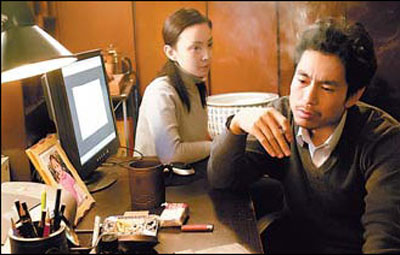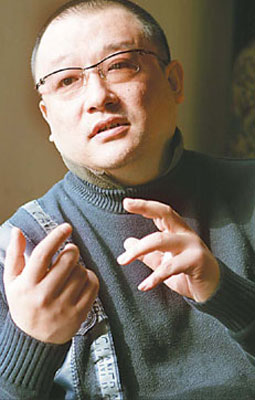Slumped over in an orange, velvety sofa at a teahouse in Beijing's Sanlitun area, Wang Xiaoshuai appears both relaxed and spirited. The man, who is in his early 40s, is one of China's most active directors.
His eyes convey a sense of stubbornness as he speaks with sweeping gestures.
Despite the fact that his first three films-The Days, Frozen and So Close to Paradise-were not considered commercially appealing enough to screen in China, he has been steadfast in his filmmaking, pushing forward with both legal and underground projects.
A scene from Wang Xiaoshuai's In Love We Trust, which will premiere at the Berlin Film Festival on February 8. (file photo: China Daily)
Wang has every reason to be light-hearted. He is preparing to depart for the 58th Berlin International Film Festival, which runs from February 7 to 17. His latest film, Zuo You, or In Love We Trust, will premiere there on February 8.
"The crew will leave on February 7-the first day of the traditional Chinese Spring Festival," Wang says. "Don't ask me whether the film might win an award. I don't know, because I'm not on the jury."
The director is a frequent visitor of international film festivals, especially the three top film festivals-Berlin, Venice and Cannes. Wang won a Silver Bear award for his Beijing Bicycle in Berlin in 2001, and he claimed a "Prix du jury" award for his Shanghai Dreams at Cannes in 2005, in addition to numerous nominations.
"I'm just making films I like, and luckily, the juries of the Berlin International Film Festival also like my film," he explains.
"I'm in no rush. So far, I haven't seen any other films scheduled to show at the festival, so I can't make any judgment. All I know is the film I made."
Based on a true story, In Love We Trust tells the tale of a divorced couple who discovers their daughter is about to die from blood cancer. They must bear another child together and use blood from the baby's umbilical cord to save their daughter.
The film features leading actress Yu Nan, star of last year's Golden Bear award winner Tuya's Marriage, Zhang Jiayi, Liu Weiwei, Tian Yuan and Cheng Taishen.
Wang Xiaoshuai believes Western audiences will connect with his film despite the cultural barriers. (photo: China Daily)
"In Chinese, 'zuo you', or 'left and right', means decision-making and hesitation, love and betrayal," he explains. "Basically, it is about human nature."
"The story is a cross-border tale, because it could happen anywhere in the world."
"I believe viewers from China and any other country in the world will understand what's behind it-human love and trust."
"After watching the film, they will ask 'what if this happens to me?'"
"I have given my answer from my point of view in the film. Now, it is your turn."
Although the plots and settings of his films have changed over the years, some characteristics of his directing style remain constant. Wang consistently renders realistic characters, such as the man next door, the confused schoolchild or the regrettably stubborn father figure.
Wang's father once worked in a Peking Opera Troupe in Guizhou Province, and from the age of three, Wang would watch movies adapted from Peking Operas, such as Shajiabang and Haigang.
His encounters with such movies early in life led him to study at the director department of the Beijing Film Academy after he graduated from the Central Academy of Fine Arts.
Wang went on to develop a deeper interest in cinematography, and he made his first underground independent film, The Days, in 1993. In 1996, he completed Frozen and in 1998, he released So Close to Paradise.
Since then, he hasn't stopped making films, despite facing many obstacles.
Wang says film is another form of aesthetic expression, akin to painting or sculpting, and he believes he has found his calling as a filmmaker.
He is still striving for the optimum balance between his own artistic vision and public recognition. Wang's later movies-Beijing Bicycle in 2001, Drifter in 2003 and Shanghai Dreams in 2005-demonstrate how he succeeded in this goal.
"I really wanted to preserve the essence of China on film and create a uniquely Chinese expression," Wang says. "The bicycle is the most archetypical symbol of China. Hollywood has its fancy car chases, but we don't have to do action sequences with a car; we can do them with a bicycle."
He says he doesn't have audiences-at home nor overseas-in mind when filming, "because it is difficult to cater for all tastes".
"As a filmmaker, I want to tell good stories that are real and thought-provoking."
"Viewers will find the emotional connection, as long as the stories are good. The relationship between films and audiences is like that of lovers: Beauty is in the eye of the beholder."
In the past three years, Wang has searched for a new form of narration that is meaningful to him, "which can still preserve my attitude and sensitivity towards people and the society. That is what I have to do in In Love We Trust."
He says overseas audiences can understand the film despite cultural barriers.
"Humans are basically vulnerable, particularly when they face illness, death or social change," he says.
"To survive and to withstand social pressure from the outside, people must train themselves to be strong. It doesn't matter where you are from; you are still human, and become perplexed and experience emotional upheavals."
After the film's competition in Berlin, the director plans to bring the movie to Chinese cinemas. When talking about his expectations for its box-office performance, Wang shrugs.
"You should hold different expectations for different kinds of films," he says.
"For example, when watching Harry Potter, you should expect the experience to be light-hearted and fun. When watching Mission Impossible, you should expect to enjoy the special effects and dazzling action provided by Tom Cruise. And when watching my films, you should expect to feel intense emotion, but you will come away with something to ponder."
(China Daily February 5, 2008)



